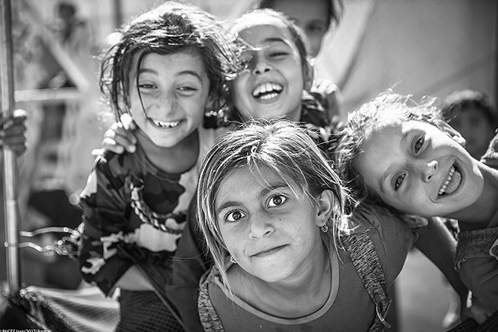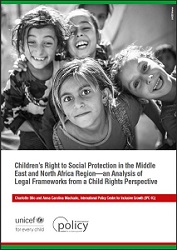New IPC-IG and UNICEF study assesses children’s right to social protection in the MENA Region

Brasília, 08 November 2018—Most of the 20 countries in the Middle East and North Africa (MENA) region have some sort of legal guarantee regarding social protection in their constitutions. However, only five—Bahrain, Egypt, Iran, Iraq, and Morocco—clearly extend the right to social protection or to an adequate standard of living to all children. This is one of the findings of a new study titled “Children’s Right to Social Protection in the Middle East and North Africa (MENA) Region—an Analysis of Legal Frameworks from a Child Rights Perspective”, published by the International Policy Centre for Inclusive Growth (IPC-IG).

While increased attention is being paid to the role of social protection in improving human development indicators, especially among children, it is important to remember that access to social protection is not just a matter of policies but one of rights, as also enshrined in several international human rights instruments, including the Convention on the Rights of the Child (CRC). A human rights-based approach to social protection foresees that programmes are anchored in a system of rights, clearly establishing citizens’ entitlements and corresponding obligations for the State.
"Social protection is a fundamental human right. As such, it is more than just a matter of charity or of policy; everyone—including children—should have the right to it. For this, it is crucial that social protection programmes are embedded in comprehensive legal frameworks. However, in the MENA region this is often not the case yet. For example, some of the region’s major cash transfer programmes for families with children are not yet anchored in legislation”, said Charlotte Bilo, IPC-IG Researcher and co-author of the study.
By legal frameworks, the study refers to national legislation, decrees, or regulations. In additon, it also assesses the extent to which these frameworks comply with a minimum set of human rights criteria. Having a comprehensive legislation is an important step to guarantee the right to social protection for every child. According to Charlotte, the study points out that while some legal frameworks are relatively comprehensive—such as Iraq’s Law No. 11 of 2014—many lack important features, such as clear complaints and grievances mechanisms or other channels for citizen participation.
From MENA to the world —The MENA region has a long tradition of providing social support to the most vulnerable segments of society. However, government-led social protection programmes and policies remain limited in many countries of the region, often relying to a large extent on food and fuel subsidies and on support from charities and non-governmental organisations. Yet, in recent years, the region has seen the gradual introduction of subsidy reforms that included the introduction or scale-up of targeted cash transfer programmes – such as in Iran and Egypt.
The study seeks to answer three main questions: What is the status of the right to social protection in the region? Are social protection programmes embedded in legislation?How are human rights principles enshrined in the legal frameworks of the programmes? To this end, the research team performed an in-depth analysis of non-contributory programme legislation and other legal instruments (including national constitutions, social protection strategies and child rights acts) across all countries in MENA: Algeria, Bahrain, Djibouti, Egypt, Iran, Iraq, Jordan, Kuwait, Lebanon, Libya, Morocco, Oman, Qatar, Saudi Arabia, Palestine, Sudan, Syria, Tunisia, Unite Arab Emirates, and Yemen.
" Our main goal with this study was to analyse the extent to which government-implemented social protection programmes in the MENA region are anchored in national legal frameworks. Importantly, programmes enshrined in laws are less prone to changes in government priorities and establish entitlement of citizens” said Anna Carolina Machado, IPC-IG Researcher and co-author of the study. Other contributors include IPC-IG Senior Research Coordinators Fábio Veras and Rafael Osório.
The study also highlights what still remains to be done to enhance social protection legislation in line with a human rights-based approach. These findings are likewise useful for other regions in the world. This is the second in a series of four studies that have been developed as part of a partnership between the IPC-IG and the UNICEF Middle East and North Africa Regional Office (MENARO). The series was launched with an “Overview of non-contributory social protection programmes in the Middle East and North Africa (MENA) region though a child and equity lens.” The two forthcoming studies will discuss ways to increase fiscal space and resources for social protection for children and assess whether the existing systems in the region are equipped to continue providing protection when faced with shocks, such as conflicts or natural disasters.
Read also:
- One Pager Series: "Overview of non-contributory social protection programmes in the Middle East and North Africa (MENA) region though a child and equity lens" in Algeria, Bahrain, Djibouti, Egypt, Iran, Iraq, Jordan, Kuwait, Lebanon, Libya, Morocco, Oman, Palestine Qatar, Saudi Arabia, and Sudan. Find them all here, sorted by language: Arabic, English, French and Portuguese.
- Working Paper "The role of zakat in the provision of social protection: a comparison between Jordan, Palestine and Sudan". This paper explains the relationship between zakat—one of the five pillars of Islam, which can be understood as a religious duty of those who are well-off to help those in need through financial or in-kind contributions—and social welfare.